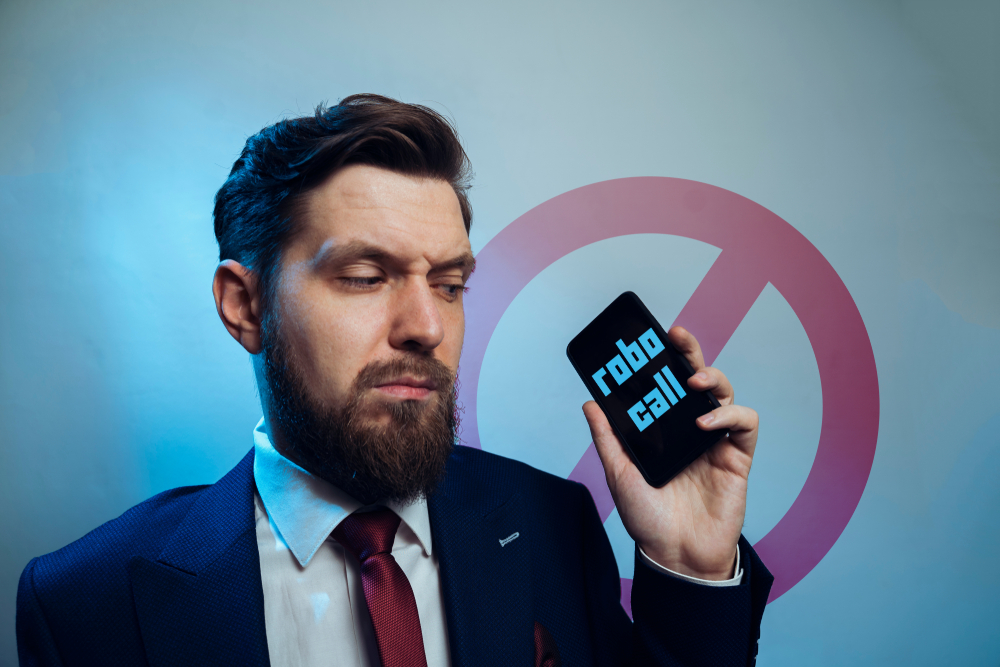Few things are as disruptive as answering your phone only to hear a prerecorded pitch, a fraudulent “final notice” about your car warranty, or a vague sales offer from a company you’ve never heard of. If you’ve experienced persistent robocalls or unlawful texts, you may have a claim worth pursuing. An experienced TCPA lawyer in Florida can investigate your situation, determine whether violations occurred, and help you recover statutory damages.
Abrams Justice Trial Attorney takes these cases seriously. We review every detail, gather evidence quickly, and pursue maximum recovery while holding violators accountable. Below are the clear signs you may have a strong robocall lawsuit in Florida.
Sign 1: You Never Gave Written Permission to Be Called or Texted
If you’re getting robocalls or automated texts from companies you don’t recognize—and you never gave them clear, written permission—this is one of the most powerful signs you have a case. Telemarketers can’t legally use recorded voices, mass texts, or autodialers to reach you unless you specifically agreed, usually by checking a box online or signing something. It doesn’t matter if you vaguely remember entering a sweepstakes, or if you just gave your number to someone at a store. The agreement must be obvious, up-front, and explain you’ll get these kinds of calls.
Companies have lost big when they couldn’t produce this kind of written permission. If you’ve never filled out a form, signed up for texts, or clicked “I agree” on a website, every unsolicited robocall or text could mean money damages for you. Save your call logs and don’t delete voicemails—this could be the foundation of your claim.
Sign 2: The Calls or Texts Continued After You Told Them to Stop
Even if you once said yes to marketing calls or texts, you have the right to change your mind at any time. If you tell the caller or texter to stop—whether by replying “STOP,” asking during a live call, or emailing the company—they are required to honor that request right away. Unfortunately, some telemarketers ignore these opt-outs and keep blasting you with unwanted messages.
Courts have been quick to side with consumers who can show they clearly revoked consent but still got calls. Each additional message after you’ve opted out isn’t just a nuisance—it’s a separate violation and could increase what you’re owed. The key here is to document how and when you told them to stop. Save those texts, take notes on the date and time of your request, or keep copies of any emails you sent. This pattern of ignoring your wishes is strong evidence for a lawsuit.
Sign 3: You’re on the Do Not Call List but Still Getting Sales Calls
Signing up for the National Do Not Call Registry should mean you don’t have to deal with random sales pitches. Telemarketers are required to check these lists and skip your number. If you’ve been on the Do Not Call list for at least 31 days and you’re still getting robocalls, especially if you never gave direct permission, you likely have a very strong claim.
Courts often see Do Not Call violations as “slam dunk” cases, because it’s so easy to prove your number is registered. If you’ve taken the time to put yourself on the list and companies keep calling, it suggests either sloppiness or willful disregard of the law. Keep a simple log of which companies contact you, what time, and what they say. This documentation can make your claim even stronger.
Sign 4: You’re Getting Flooded With Calls in a Single Day
It’s not just about whether you get one or two robocalls—getting hammered with multiple sales calls about the same thing in a short time is another warning sign. Florida law says you shouldn’t get more than three calls from the same company about the same offer in a 24-hour period. If you’re getting four, five, or even more robocalls or texts in one day, this often crosses the line from marketing to harassment.
Courts and regulators treat excessive frequency as a major problem, sometimes awarding higher damages because it shows the company wasn’t just careless—they were relentless. Save your call history or screenshot your phone if you’re getting bombarded. High-volume calling is a clear marker that you may have a case worth pursuing.
Sign 5: The Calls Use a Recorded or Robotic Voice
If you pick up the phone and hear a recording instead of a real person—or you get voicemail messages from a robotic-sounding voice—these are classic signs of robocalls. Telemarketers must have your express permission to use recordings or automated voices for sales pitches. The rules are especially tough when it comes to these types of calls, because consumers overwhelmingly find them disruptive.
People who’ve brought successful lawsuits have often saved their voicemails or even recorded a few calls as proof. It doesn’t matter if you hang up right away or if you never signed up for these calls in the first place—if there’s no clear written consent, every call is a potential violation. If you’re routinely hearing a robot or recording before you ever talk to a person, you may have grounds to take legal action.
Sign 6: The Caller Won’t Say Who They Are or What Company They’re With
Transparency matters. Telemarketers are required to clearly state their name, the name of their company, and provide you with a way to reach them—right at the start of every call. If you pick up and the caller is evasive, uses a generic name like “account services,” or refuses to say what business they represent, that’s a violation. Similarly, if your caller ID just says “unknown” or “private,” and you never get a real company name, that’s also suspicious.
Cases based on this kind of “shadow calling” often succeed, especially if you can show a pattern of vague or misleading identification. Courts recognize that deception in telemarketing is a red flag, and failure to identify is taken seriously. If you can’t pin down who’s calling, or if the caller ID doesn’t match what they say, you have a strong basis for a claim.
Sign 7: You’re Getting Calls Early in the Morning or Late at Night
Nobody wants to be jolted awake by a sales pitch at 7 a.m. or interrupted during family time late at night. Telemarketing rules ban most sales calls before 8:00 a.m. or after 8:00 p.m. in your time zone—even if you’ve given prior consent for other calls. Companies that violate these time windows often face higher penalties, since these calls are especially intrusive.
If you’ve received robocalls outside of these legal hours, make note of the time and date, and save any voicemails. Courts have upheld consumer claims based solely on illegal call timing, and it’s one of the simplest violations to prove with your phone records. Even one or two late-night or early-morning calls can tip the scales in your favor.
Sign 8: The Calls Are Costing You Money
Some consumers are hit with charges because telemarketers call their VoIP, toll-free, or pay-per-minute business lines. The law doesn’t let companies shift their marketing costs onto you. If you pay for each incoming call or text—maybe on your work line, business cell, or a home phone with usage fees—robocalls can quickly get expensive.
Documenting your phone bill and linking it to unwanted calls is often enough to support a claim for both statutory and real damages. Courts recognize that these costs add up, and they’re quick to hold telemarketers accountable when consumers end up footing the bill. If you can show you lost money due to unsolicited robocalls, you likely have an even stronger case.
Sign 9: The Company Keeps Calling After You’ve Complained or Sent a Written Notice
If you’ve already told a company—either over the phone, by text, or in writing—to stop contacting you, and they keep going, the law is much tougher on them. Continued calls after a clear opt-out are usually considered “willful” violations, which can result in higher damages (sometimes triple the usual amount). Courts see these cases as especially serious, since the company ignored your direct wishes.
Keep records of every time you asked to be removed from the call list, and any written correspondence or complaints you’ve sent. This repeated, stubborn behavior from telemarketers is often what turns a routine case into one with significant recovery potential. Persistent violations are a key sign you have a strong claim.
Sign 10: The Caller ID Looks Fake or Misleading
Many robocallers use “spoofing” to disguise their real number, making it look like a local or trusted business is calling. If you answer and realize the caller isn’t who the caller ID suggests—or if you call back and reach a disconnected number or the wrong business—this is a major warning sign.
Courts and regulators treat spoofing seriously, especially if it’s combined with other violations like robocalls or unwanted texts. If you suspect a number has been spoofed, keep a record or take screenshots of your caller ID and make notes about what happened. Using a fake or misleading number to trick you into answering strengthens your potential case considerably.
Call a TCPA Lawyer About Robocalls Today
Many Floridians aren’t aware that the law actually favors the consumer when it comes to robocalls. You have more power than you think, and a strong robocall attorney in Florida can make all the difference. When you know the warning signs and keep good records, you turn every unwanted call into potential evidence. If any of the signs above sound familiar, you could be entitled to significant compensation. Abrams Justice Trial Attorney has the skill, resources, and dedication to pursue every available remedy, from statutory damages to injunctive relief.
Don’t wait for the calls to stop on their own—contact us today to speak with a TCPA lawyer in Florida who will take action to protect your rights, hold telemarketers accountable, and help you reclaim your peace of mind.


